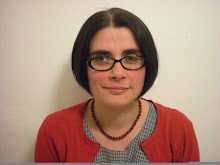Yesterday I attended the above course which was organised by the CPD25 group and held at Birkbeck College, London. A copy of the programme can be found at http://www.cpd25.ac.uk/extcalendar/1804.
The day was opened with a talk by Michael Martin, Qualifications and Professional Development Adviser for CILIP which included an overview of the accreditation criteria for Library and Information Science courses. I was reassured by the message that no matter which accredited course I should choose to follow, my qualification would not restrict me to one sector of the profession and would be recognised internationally. I was also interested to learn that I could register to charter on graduating as I had assumed that I would have to hold a professional post for a set period of time beforehand.
The most pertinent presentations were from Vanda Broughton, Lecturer in Library Studies at UCL and Briony Birdi, Lecturer in Librarianship at the University of Sheffield. They both gave an overview of the courses offered at their respective institutions, the application process, sources of funding, what to expect from a second degree and what to consider when choosing a course. They also described their ideal candidate and although they had slightly different perspectives, essentially their opinion was the same, i.e. someone with a year's relevant work experience, at least a second class degree, sound ICT skills, an understanding of and an enthusiasm for the profession and the ability to reason and communicate well. This was reassuring as I believe that to a greater or lesser extent I meet these criteria. It was also comforting to know that most of the things they recommended doing in preparation for applying for a course, i.e. joining CILIP, reading Update, subscribing to relevant e-mailing lists, reading graduate trainee websites, obtaining detailed module outlines, I have already been doing.
It was useful to have these views complimented by an employer's perspective in the form of a presentation by Karen Stanton, Chief Information Officer and College Librarian at Kings College London. Karen presented her vision of the Librarian 2012 using the example of the impact that open access publishing of research may have on the current roles and skills set of today's information professional. She forecast the erosion of traditional tasks such as stock selection, preparation and organisation and the provision of a physical library service and predicted the dominance of virtual information services delivered by consortia of institutions and focusing on user support and education, management of institutional repositories, on-demand digitisation, digital preservation and data mining. Her vision reveals the rapid pace of change and innovation that librarianship is currently undergoing and rather than being a cause for despair, suggests that this is an extremely exciting time to be entering the profession. It also confirms my own belief that strong ICT, research and analytical skills are going to be desirable assets to employers in the future and that when I am considering individual courses I should be assessing whether they will equip me with these skills.
The last presentations of the day were from Baljit Boparai, a distance learning student working full time at the University of East London, and Julia Bloxham, a recent LIS graduate from Thames Valley University currently working at Kingston University. Although they chose different modes of study they both stressed that choosing to study a postgraduate LIS course is not a decision to be taken lightly and described the sacrifices that they have had to make in terms of money, free time and the impact on personal relationships. This served as a timely reminder of the hard work and dedication that is needed in order to complete a LIS course successfully. Although this initially reawaken my fears of returning to study, I was heartened by Julia's experience as she was a mature student who has just been awarded a distinction despite not having a first degree. This has made me realise that the study support offered to students, particularly mature students, will need to be a central consideration when choosing a course that's right for me.
Perhaps the most beneficial aspect of the day was the opportunity to talk to other prospective LIS students and realising that they too share some of my apprehensions about applying for a course. It was reassuring to see that they were not all young, recent graduates and that they came from a variety of backgrounds both in terms of their education and their work experience. As a lot of the people I spoke to were also looking to study in London it was also helpful to garner their opinions on the courses that I have been looking at.
In short, this was an incredibly informative and helpful day which I would wholeheartedly recommend to anyone considering applying for a LIS course in the future.
Welcome
Hi, my name is Jo and I'm a newly qualified librarian working in several academic libraries in Cambridge.
I originally created this blog as an electronic learning journal whilst participating in an extended shadowing programme prior to starting the MA in Information Services Management at London Metropolitan University.
The views expressed here are entirely my own.
I originally created this blog as an electronic learning journal whilst participating in an extended shadowing programme prior to starting the MA in Information Services Management at London Metropolitan University.
The views expressed here are entirely my own.





No comments:
Post a Comment